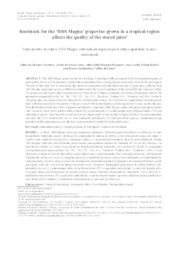Rootstock for the BRS Magna grapevine grown in a tropical region affects the quality of the stored juice.
Rootstock for the BRS Magna grapevine grown in a tropical region affects the quality of the stored juice.
Author(s): FERREIRA, T. de O.; LIMA, A. de S.; BIASOTO, A. C. T.; RYBKA, A. C. P.; LIMA, M. A. C. de
Summary: The ‘BRS Magna’ grapevine has the advantage of adapting to different regions of Brazil and producing juice of good quality. However, it is necessary to define the components of the cropping system, such as the rootstock, for each region. The aim of this study was to characterise the chemical composition and antioxidant capacity of grape juice collected from ‘BRS Magna’ grapevines grown on different rootstock under the tropical conditions of the Sub-middle São Francisco Valley. The grapes were harvested in the Experimental Area of Bebedouro/Embrapa Semiárido, in Petrolina, Pernambuco, Brazil. The treatments corresponded to the ‘IAC 766’, ‘IAC 572’, ‘IAC 313’, ‘Freedom’, ‘Paulsen 1103’, ‘Harmony’ and ‘SO4’ rootstock. The grape juice was prepared from two harvests for evaluation after storage. For each harvest, a randomised block design was used, with four replications. The quality of the juice varied with the treatment in each storage period. At nine months, the juice from the first harvest showed a loss of pigment and phenolic compounds, while the juice made with grapes from plants grafted onto ‘Harmony’ stood out for soluble solids content (SS), colour intensity (CI), anthocyanins, total polyphenol index (TPI) and antioxidant capacity. Juice from the second harvest was characterised at four months by higher levels of various compounds, especially the ‘SO4’ treatment for SS, CI, total extractable polyphenols, TPI and antioxidant capacity. Considering storage potential and the preparation process, the less-vigorous rootstock resulted in better quality juice.
Publication year: 2020
Types of publication: Journal article
Unit: Embrapa Semi-arid Region
Observation
Some of Embrapa's publications are published as ePub files. To read them, use or download one of the following free software options to your computer or mobile device. Android: Google Play Books; IOS: iBooks; Windows and Linux: Calibre.
Access other publications
Access the Agricultural Research Database (BDPA) to consult Embrapa's full library collection and records.
Visit Embrapa Bookstore to purchase books and other publications sold by Embrapa.

